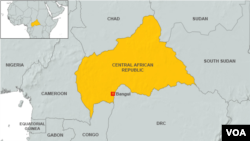A lengthy postponement of elections in Central African Republic meant to complete a return to democracy following a March 2013 coup would risk further worsening the crisis there, the top U.N. official in the region said on Sunday.
The former French colony has been paralyzed by violence for nearly two years and is now deeply divided, with its north occupied by mainly Muslim Seleka rebels who seized power nationwide last year but were forced to step down in January.
The United Nations took over peacekeeping operations there last month, but violence continues to simmer between the rebels and Christian militia, leading officials in the country to see a postponement of the polls as inevitable.
Some have suggested that the elections, currently scheduled for February, could be delayed until after next year's July to September rainy season.
“Even if it's true that we cannot keep to the February date, we must not push it off too far, because the risk of worsening the crisis is there,” Abdoulaye Bathily, head of the U.N. Regional Office for Central Africa, told French-language broadcaster TV5 Monde. “I think we can... reasonably think that with a few extra weeks we can wrap things up,” he said.
At full strength the U.N. mission in the former French colony is due to number some 12,000 troops, roughly double the number deployed under the previous African Union force.
Seleka and the so-called anti-balaka, or anti-machete, Christian militias agreed to a ceasefire in July. But while the violence has eased in parts of the country, especially in the capital Bangui, rights groups have said inter-religious clashes have increased in the center and the east in recent months.
French peacekeeping troops killed at least five gunmen last week after coming under attack by both Muslim and Christian fighters at two different locations in the town of Bambari, northeast of Bangui.
“What is important is that... we have succeeded in obtaining the signature of an agreement to end hostilities. It works,” Bathily said.
Central African Republic is rich in gold and diamonds but has seen much conflict and political instability since gaining independence from France in 1960. The last two years of violence have killed thousands and forced around 1 million -- about a quarter of the population -- to flee their homes.





